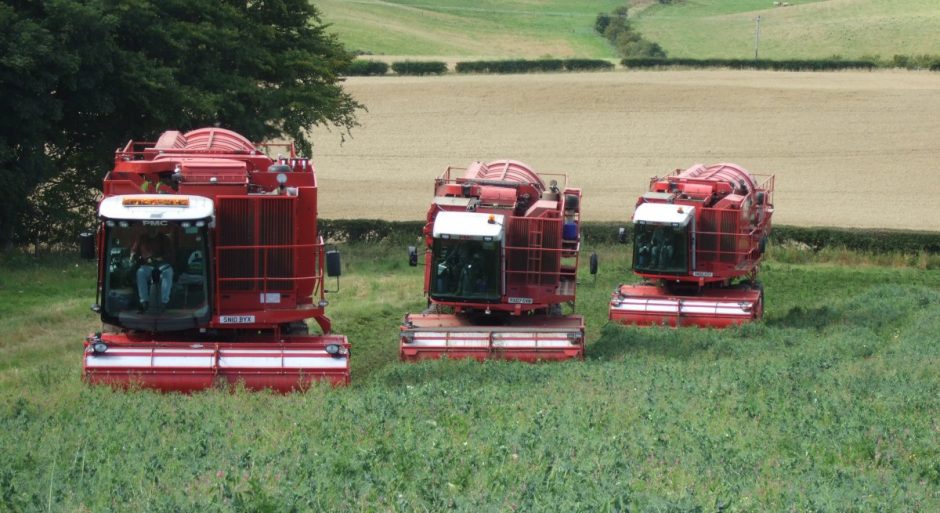This year’s annual conference of the Scottish Agricultural Organisation Society (SAOS) looked for signs of optimism in the face of modern challenges – and said a better awareness of the benefits of co-operation is essential to overcoming them.
CEO Tim Bailey opened the event telling members they needed to “look past Covid-19 and Brexit and be positive”. He said there was a growing world population which would need feeding, and Scottish agri-co-ops have the partnerships and knowledge to do this.
These challenges are still formidable ones, delegates heard – in a conference, like all other events, forced online by the pandemic. James Withers from Scotland Food and Drink said Brexit had seen the industry rolled into a transition period just a few hours after the border operating model was published and the picture has been changing ever since, prompting “bewilderment, anger and despair from makers of perishable products”.
“Things have started grinding to a halt,” he warned – but added: “We have a unique way of working in Scotland” with different organisations – from trade bodies to government – working together, which means the sector is now focused on recovery from the Covid-19 crisis and ways to adapt to the long term disruption from Brexit.
“We need to use it as a springboard to something better,” he said. “Lockdown has seen more Scottish produce sold on Scottish doorsteps. We now need to service more UK markets. How do we supply London and other regions?”
To do this, and to remain resilient when other changes occur, the sector needs the right infrastructure, with supply chain work, business support and market intelligence, he said.
“If I was being brutal I wouldn’t give a penny in support to a farm if it wasn’t involved in co-operation,” added Mr Withers. “Co-operation and collaboration are the most important things we can do.”
This innovative, collaborative spirit can help the sector meet other challenges, the conference heard. George Noble, project manager at SAOS, said work is continuing to develop the use of data to combat food waste and climate change, for instance with the use of sensors to measure heat and monitor water consumption. Sensor tech can also measure soil temperature and moisture, so farmers will know the optimal conditions to add fertiliser.
“A third of world’s food produce is lost or wasted,” he said – adding that although farmers are only responsible for a small part of this, they can cut it further, again through use of sensor technology, which can offer real-time data on crop storage conditions.
Emma Patterson Taylor, the climate change and sustainability lead at SAOS, said data on carbon sequestration is being gathered on every farm in Scotland. “Data is the most powerful tool we have,” she said. “It has allowed us to get carbon estimates for all farms.”
Jim Booth, head of co-op development at SAOS, said lockdown had brought opportunities for the food sector, with a renewed interest in home cooking and a raised awareness of the link between food and wellbeing.
But agriculture in Scotland – and the UK in general – is not as productive and competitive as it should be. There are many reasons for this but “one of the main ones is a lack of co-operation. Co-operation increases productivity and adds value.”
In the EU, the agri-food sector has 40% participation in co-ops, he said; the figure is only 8% in the UK, although Scotland is better at around 30%. There is still not enough appreciation of the benefits of co-operation, he said. “We need to change mindsets and transfer knowledge.”

Examples of how this can be done include the progress made by the specialist cheese sector, which SAOS’s supply chain development
director Alan Stevenson said had recorded a ten-fold increase in exports. New markets have been developed in Asia and North America, “all thanks to collaboration and support across the board”.
Tim Bailey added that supply chain co-operation needs improvement and more consistent access to funding, tied into Covid recovery programmes and targeted strategically at promising areas.
He said SAOS wants to follow the example of Australia to encourage investment in co-operation; in Australia the Farming Together pilot programme has driven the creation of dozens of new co-ops, creating better buying and selling power, and driving investments processes.
The challenge now, said Mr Bailey, is “moving co-operative ambition to the next stage. Co-ops need to consider themselves as other businesses do: to look at their USP, their competitive advantage … plus their ethos and principles”.
He said there were problems with popular misconceptions around the word “co-op”. “If we came up with it as a new model, with a snazzy 21st century word for it, people would welcome it. We need to change the narrative of co-ops as a failed business model … and stop underplaying our hand.”
SAOS is continuing to promote the ideas of the conference; on 24 February it held a webinar on the use of smart digital tech to improve productivity, profitability and sustainability.
“Developments in the Internet of Things (IoT) technology mean that whole farms can now be digitally connected with a collection of sensors – allowing real-time monitoring of crops, livestock, machinery, soils, stores and people,” the organisation said in a release. “SAOS, SmartRural, NatureScot and RSABI are pioneering this exciting technology on a range of farm demonstration sites across Scotland.”
The webinar brought together farmers, crofters and their advisers, to share the results from a one-year pilot project to test low-power smart sensors on SAOS’s three demonstration farms.
Jim Booth said: “Although this technology is widely used around the world, we wanted to know if, and how, it can benefit Scottish farmers. This is only the start of the journey towards the digital revolution to help farmers transform their businesses, but what we’ve achieved and learned in one year, especially as one as challenging as this, has been amazing.”